![Medicine - Cancer Biology E-Newsletter [Vanderbilt University]](https://cdn.vanderbilt.edu/vu-URL/wp-content/uploads/sites/119/2017/11/19151037/cancer-biology-design-004.png)
|
|
November 2019
|
|

As the bustle of the holiday season is gearing up and 2019 is coming to a close, I’ve been thinking about what is important to me and for what I’m thankful. I am grateful for the work that I do and the supportive environment in which I work. I truly enjoy my collaborations with faculty across Vanderbilt to pursue a better understanding of cancer and to advance new treatment strategies. I am constantly reminded that we each contribute to something much greater than ourselves and together we make a tremendous impact on so many people. I hope that you also see the impact of your work. What are you thankful for?
Kimberly Brown Dahlman, PhD
Assistant Professor of Medicine
Getting to Know You…
Faculty Spotlight:
 Lisa McCawley, PhD Lisa McCawley, PhD
Research Associate Professor, Department of Biomedical Engineering. Faculty fellow of the Vanderbilt Institute for Integrative Biosystems Research and Education (VIIBRE)
Lisa received her Ph.D. in 1998 with an emphasis in Pharmacology/Toxicology from Northwestern University, Chicago IL. Her background is in the area of matrix metalloproteinases (MMPs) and how they regulate cellular processes that contribute to tissue remodeling processes. Current research is directed towards understanding how changes in cell populations and other factors of the tissue microenvironment (ie., oxygenation state, pH and matrix composition) influence wound repair and tumor progression. With her engineering collaborations in VIIBRE, she is developing and applying BioMEMS to interrogate the biophysical and biochemical processes governing cellular migration, transendothelial migration and tissue invasion. She is developing bioreactors to reconstitute tissue using cellular populations (i.e., immune cells, endothelial cells, fibroblasts, normal and/or tumorigenic epithelial/epidermal cells) and/or maintain tissue biopsies under normal (physiological) and/or diseased (pathological) conditions. She is continuing the development of Organ-on-a-Chip style microfluidic bioreactors targeting three-dimensional cell cultures in the areas of mammary development and response to environmental toxins; breast tumorigenesis and response to therapy in complex microenvironments; and the blood brain barrier.
Lisa is married to Shawn Garbett, M.S. who works in the Department of Biostatistics at VUMC. Outside of lab, she enjoys board gaming and making cheese; weather permitting, staring up into the sky with her telescope, and working on one of her many house projects.
Trainee Spotlight:

Justine Sinnaeve, BS
Graduate Student
(Ihrie Laboratory)
Justine is from Troy, Michigan and earned her B.S. in Biology from Duke University. At Vanderbilt, she joined the laboratory of Dr. Rebecca Ihrie where she studies single-cell protein expression in primary brain tumors, specifically grade 3 gliomas and glioblastomas. Justine uses patient samples collected here at Vanderbilt and high-dimensional data analysis of mass cytometry data to understand cellular phenotypes associated with patient outcomes and stem cell niche contact. Her most recent work on a collaborative project with the Irish Lab and Dr. Nalin Leelatian has resulted in the identification of two distinct populations of glioblastoma cells that are differentially associated with patient overall survival, as well as the development of a novel data analysis workflow. This work has implications for how patients are stratified for clinical trials and the design of new therapeutic regimens for future studies. Justine has contributed to programming efforts in the Program for Developmental Biology and the BRET Career center and is a member of the Vanderbilt Club Water Polo team.
Staff Spotlight:

Jing Hao, MD, MS
Laboratory Manager
(Quaranta Laboratory)
Jing earned her M.D. from China and M.S. in Biology from Andrews University in Michigan. She joined the Quaranta lab when Dr. Quaranta moved from Scripps to Vanderbilt in 2004. She helped establish the Quaranta lab and served as the lab manager for 15 years. She assisted with Dr. Quaranta to set up Tissue Culture Core (P50) and Protein Expression Core, where she interacted with multiple investigators. In addition to performing the administrative, research, and technical duties of the laboratory her research runs from cell culture to animal work and from molecular biology to large scale protein production. She has participated and made significant contributions to a wide range of projects and publications. In her spare time, she enjoys time with her family, hiking, dancing, cooking, and reading.


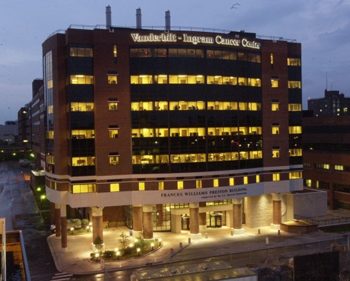
Clinical Trials Search at Vanderbilt Ingram Cancer Center
At Vanderbilt-Ingram Cancer Center, we are dedicated to developing new and better cancer care options through continued commitment to clinical trials. Patients seek out our center because of our extensive range of trials, expert specialists, active Phase I program and supportive team that’s at their side every step of the way. Search our open clinical trials by disease, physician/investigator, treatment type and drug names above.
VICC Shared Resources
Vanderbilt-Ingram supports a number of institutional shared resources that provide investigators access to cutting edge technologies that are impractical to set up in individual laboratories. In addition to providing cancer center members access to state-of-the-art instrumentation and methodology, the shared resources facilitate education and technology transfer by holding workshops for members and other Vanderbilt faculty.
VICC takes leading role in international cancer database project
VICC, Dana-Farber Cancer Institute and Memorial Sloan Kettering Cancer Center are participating in the Project GENIE (Genomics Evidence Neoplasia Information Exchange) Biopharma Consortium, a collaboration between the American Association for Cancer Research (AACR) and nine biopharmaceutical companies. The goal is to augment over the next five years the GENIE database, a publicly accessible international cancer registry assembled through data sharing between 19 of the world’s leading cancer centers.
19th Annual Retreat for Cancer Research
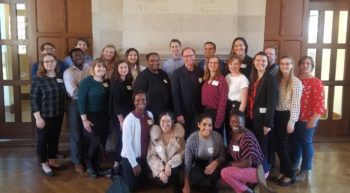
Photo: Cancer Biology Program Graduate Students
On October 4th the 19th Annual Retreat for Cancer Research was held at Alumni Hall at Vanderbilt University. The retreat was hosted the VICC Host Tumor Interactions Program and Program in Cancer Biology. The featured keynote speaker was Thomas F Gajewski, MD PhD the AbbVie Foundation Professor of Cancer Immunotherapy at the University of Chicago. Dr. Gajewski has been highly recognized for his contributions to anti-tumor immunity and bringing these concepts forward from the laboratory into clinical trial testing. Also working on melanoma vaccine strategies, his laboratory uncovered a role for downstream resistance pathways allowing tumor evasion from the immune response.
Other highlights of the event included talks by our Patient Advocate, Postdoctoral fellows, Faculty, and Graduate students, a poster session, and a silent auction to benefit Gilda’s Club. Tennessee businesses and retreat attendees raised $1,600 to support cancer patients and their families at Gilda’s Club!!
|
|
CALENDAR OF EVENTS @ VANDERBILT
VICC Seminars
BRET Seminars
Discovery Lectures
Flexner Deans Lectures Series
Discover Cancer Research Program
Applications due by Feb 1st
Welcome to Drug Discovery Online
Pharmacology Seminars
Department of Cell and Developmental Biology
CONFERENCES OF INTEREST
The 2020 Annual MVTCP Symposium will be on
Feb 8th, 2020 @ Meharry Medical College.
Register here
Vanderbilt‐Ingram Cancer Center Annual Scientific Retreat April 22, 2020.
“Impact of the Obesity Epidemic on Cancer.”
Society for Immunotherapy of Cancer (SITC)
Advances in Cancer Immunotherapy,
Nashville TN December 4, 2019
Gordon Research Conferences
6th Annual Midwest Tumor Micro environment Meeting
The University of Kansas Medical Center, Kansas City, Kansas
WEBSITES OF INTEREST:
Events at Vanderbilt
VUMC Reporter News
Vanderbilt Magazine
Know your CORE facilities at VUMC/VU
RECENT FACULTY/TRAINEES PUBLICATIONS:
Determinant roles of dendritic cell-expressed Notch Delta-like and Jagged ligands on anti-tumor T cell immunity.Tchekneva, Elena E; Goruganthu, Mounika U L; Uzhachenko, Roman V; Thomas, Portia L, et al. J Immunother Cancer. 2019 Apr 2;7(1):95.
Ahead of their time: hyperoxia injury induces senescence in developing lung fibroblasts.Sucre JMS, Plosa EJ. Am J Physiol Lung Cell Mol Physiol. 2019 Sep 11
Identification of α-N-catenin as a novel tumor suppressor in neuroblastoma.
Qiao J, Rellinger EJ, et al. Oncotarget. 2019 Aug 20;10(49):5028-5040.
Heterogeneity of Neural Stem Cells in the Ventricular-Subventricular Zone
Rushing GV, Bollig MK, Ihrie RA. Adv Exp Med Biol. 2019;1169:1-30
Polypill for Cardiovascular Disease Prevention in an Underserved Population Muñoz D, Uzoije P, et al. N Engl J Med. 2019 Sep 19;381(12)
Mucosal Immunization with a pH-Responsive Nanoparticle Vaccine Induces Protective CD8+ Lung-Resident Memory T Cells Knight FC, Gilchuk P, Kumar A, et al. ACS Nano. 2019 Oct 4
Targeted mobilization of Lrig1+ gastric epithelial stem cell populations by a carcinogenic Helicobacter pylori type IV secretion system Wroblewski LE, et al. Proc Natl Acad Sci U S A. 2019 Sep 24;116(39)
The current state of omics technologies in the clinical management of asthma and allergic diseases.Donovan BM, Bastarache L, Turi KN, Zutter MM, Hartert TV. Ann Allergy Asthma Immunol. 2019 Sep 5
PIK3CA and MAP3K1 alterations imply luminal A status and are associated with clinical benefit from pan-PI3K inhibitor buparlisib and letrozole in ER+ metastatic breast cancer. Nixon MJ,et al, NPJ Breast Cancer. 2019 Sep 23;5:31
mTORC1 as a cell-intrinsic rheostat that shapes development, preimmune repertoire, and function of B lymphocytes. Raybuck AL, Lee K, Cho SH, Li J, Thomas JW, Boothby MR. FASEB J. 2019 Sep 18
EPHB2 carried on small extracellular vesicles induces tumor angiogenesis via activation of ephrin reverse signaling Sato S, Vasaikar S, et al. JCI Insight. 2019 Oct 29

19th ANNUAL RETREAT FOR CANCER BIOLOGY AWARDS
High Scoring Abstract Award
Margaret Axelrod, BS
(Balko Lab)
Kevin Corn, BS
(Rafat Lab)
Courtney Edwards, BS
(Johnson Lab)
Adel Eskaros, MD, PhD
(Zijlstra Lab)
Jasmine Johnson, BS
(Johnson Lab)
Laura Kim, BS
(Chen Lab)
Kristin Kwakwa, BS
(Sterling Lab)
Tolu Omokehinde, BS
(Johnson Lab)
Rebecca Shattuck-Brandt,
MEd, PhD
(Richmond Lab)
Georgii Vasiukov, MD, PhD,
(Novitskiy Lab)
Melissa Wolf, BS
(K Rathmell Lab)
Poster Winners
Kyle Garland, BS
(Wilson Lab)
Margaret Axelrod, BS
(Balko Lab)
Samantha Schwager, BS
(Reinhart-King Lab)
Best Oral Presentation (Post Doc)
Derek Franklin, PhD
(Balko Lab)
Best Oral Presentation (Graduate Student)
Aaron Lim, BA
( K Rathmell Lab)
|
|
RECENT AWARDS:
 Ann Richmond, PhD, is Ingram Professor of Cancer Research, Associate Director for Research Education, and professor in the Department of Pharmacology and Dermatology at Vanderbilt University Medical Center. Dr Richmond has been honored by receiving the 2019 SLB Legacy Award, it is presented annually to a Society of Leukocyte Biology member for excellence in Leukocyte biology research and is the highest honor which the Society can bestow upon one of its members. Nominees are selected in consideration of their impact and contribution to the field of leukocyte biology through their research and publications. Ann Richmond, PhD, is Ingram Professor of Cancer Research, Associate Director for Research Education, and professor in the Department of Pharmacology and Dermatology at Vanderbilt University Medical Center. Dr Richmond has been honored by receiving the 2019 SLB Legacy Award, it is presented annually to a Society of Leukocyte Biology member for excellence in Leukocyte biology research and is the highest honor which the Society can bestow upon one of its members. Nominees are selected in consideration of their impact and contribution to the field of leukocyte biology through their research and publications.

Kimryn Rathmell, MD, PhD, is the Cornelius Abernathy Craig Professor of Medicine, Director for the Division of Hematology and Oncology at Vanderbilt University Medical Center, and Deputy Director for Integration and Training for the Vanderbilt Ingram Cancer Center. Dr. Rathmell has been honored with two awards 2019 Louisa Nelson Award.
and the 2019 Eugene P Schonfeld Award from the Kidney Cancer Association Award!
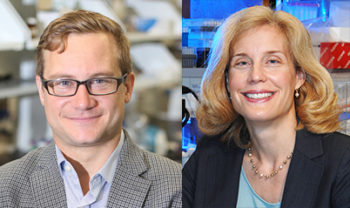
Two Vanderbilt-Ingram Cancer Center investigators have received financial support from the Susan G Koman Foundation for breast cancer research.
John Wilson, PhD, Assistant professor of Chemical and Biomolecular Engineering and Biomedical Engineering, will receive $449,616 for his project investigating chemo-immunotherapy combinations for metastatic breast cancer. Jennifer Pietenpol, PhD, Executive Vice President for Research at Vanderbilt University Medical Center and director of VICC will receive $400,000 to identify therapeutic approaches for different types of triple-negative breast cancer (TNBC), including defining biomarkers of response and resistance to chemoimmunotherapy in TNBC tumors from patients with metastatic disease.

Gastrointestinal SPORE grant is for a five-year period totaling $11.6 million.
Jordan Berlin, MD, Associate Director for Clinical Research, Ingram Professor of Cancer Research, Professor of Medicine, Director, Phase I Program and Robert Coffey MD, Professor of Medicine, Division of Gastroenterology, Hepatology, & Nutrition, Ingram Professor of Cancer Research, Professor of Cell and Developmental Biology from Vanderbilt-Ingram Cancer Center (VICC) have been awarded a Specialized Program of Research Excellence grant from the National Cancer Institute (NCI). The The researchers have succeeded in securing continuous SPORE funding since an initial grant in 2002. Competition for SPORE funding is highly competitive. Including Vanderbilt, there are currently just four medical research centers in the nation with NCI-funded SPOREs in gastrointestinal cancer. Congratulations!

Jeffrey Rathmell, PhD, director of the Vanderbilt Center for Immunobiology and Cornelius Vanderbilt Professor of Immunobiology, is a 2019 recipient of the Dr. William E. Paul Distinguished Innovator Award in Lupus and Autoimmunity. The Lupus Research Alliance award supports up to $1 million in research costs over a five-year time frame.
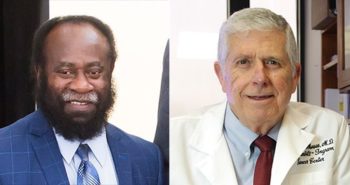 Meharry-Vanderbilt Alliance celebrates 20 years of collaboration Meharry-Vanderbilt Alliance celebrates 20 years of collaboration
Samuel Adunyah, PhD, Chair and Professor, Biochemistry and Cancer Biology at Meharry Medical College and Harold Moses, MD, Director Emeritus of the Vanderbilt-Ingram Cancer Center, Ingram Professor of Cancer Research, Professor of Cancer Biology, Medicine and Pathology were presented with the Meharry-Vanderbilt-TSU Cancer Partnership Award at the Meharry-Vanderbilt Alliance which has celebrated 20 years of collaboration. Since 1999 Meharry Medical College and Vanderbilt University Medical Center have been working together in the alliance to enhance the educational, scientific and clinical programs at and between both institutions.
The Meharry-Vanderbilt-TSU Cancer Partnership (MVTCP) would like to share their “Stop cancer together” web site information with you. Please encourage the middle school, high school and college undergrads that you work with to participate in the 5 ALIVE! Video Challenge. http://stopcancertogether.org/
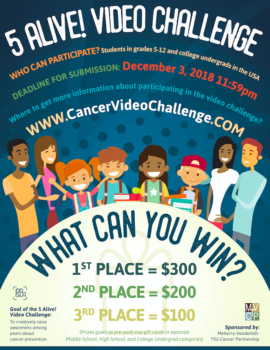
The goal is to raise awareness among young adults about 5 things they can do to prevent cancer.
Those include: HPV Vaccine, Avoiding Tobacco,Healthy Eating,
Physical Activity and
Skin Cancer Protection.
Students grades 9 – 12 as well as college undergrad submit your video by January 19,2020.
http://www.cancervideochallenge.com
View former Video winners here
The Office of Biomedical Research Education and Training (BRET)
supports and coordinates graduate education, postdoctoral training, minority affairs, career development, and educational technology initiatives for the Vanderbilt biomedical research community.
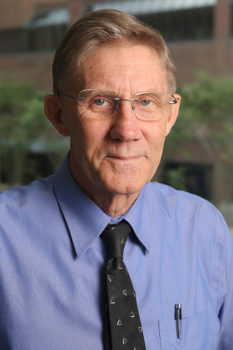
Roger Chalkley, DPhil is the Senior Associate Dean for BRET and Professor of Molecular Physiology and Biophysics, School of Medicine at Vanderbilt. He is responsible for the overview of activities of the BRET office. These responsibilities include oversight of the Post Doctoral Affairs, the IGP, the MD/PhD Program, PhD granting programs as well as Minority Activities and supporting Training Grant applications. He has published almost 200 papers in chromatin research. Dr. Chalkley has had an active interest in graduate education for many years.
The BEST (Broadening Experiences in Scientific Training)consortium is composed of 17 institutions all exploring ways of improving biomedical career development. “Implementing Career Development Activities for Biomedical Research Trainees” , provides an instructional guide for institutions wanting to create, supplement or improve their career and professional development offerings. Each chapter provides an exclusive perspective from an administrator from the 17 Broadening Experiences in Scientific Training (BEST) institutions. The book can aid institutions train graduate students in a variety of careers through the experiences of these 17 unique university graduate training programs by teaching faculty and staff on how to create and implement career development programming for biomedical research graduate students and postdocs.
VISIT THE BRET OFFICE:
ASPIRE Postdoctoral Cafe
PhD Career Stories
ASPIRE Job Search Series
ASPIRE Bistro for Graduate Students
Beyond the Lab

Our friend Peanut welcomes patients, staff and faculty in front of the Vanderbilt Ingram Cancer Center daily or you may see him by the Children’s Hospital Cafeteria looking for a treat. Take the time out of your busy day to enjoy his sweetness.
 Newsletter header photo credit to Dr. Anna Vilgelm, “DNA Comets”. Photo credit Anne Rayner, Dana Johnson, Susan Urmy, Vanderbilt University, Vanderbilt Medical Center, Meharry Medical College. Clip Art from Bing Newsletter header photo credit to Dr. Anna Vilgelm, “DNA Comets”. Photo credit Anne Rayner, Dana Johnson, Susan Urmy, Vanderbilt University, Vanderbilt Medical Center, Meharry Medical College. Clip Art from Bing
Send us your news
Have a suggestion for a Cancer Biology newsletter item? Do you have an announcement or an upcoming event you want to share with the Cancer Biology community?
E-mail: kerry.w.vazquez@vanderbilt.edu
|
|
|
Vanderbilt University is committed to principles of equal opportunity and affirmative action.
Vanderbilt®, Vanderbilt University®, V Oak Leaf Design®, Star V Design® and Anchor Down® are trademarks of The Vanderbilt University. ©2024 Vanderbilt University. All rights reserved.
|
|
![Medicine - Cancer Biology E-Newsletter [Vanderbilt University]](https://cdn.vanderbilt.edu/vu-URL/wp-content/uploads/sites/119/2017/11/19151037/cancer-biology-design-004.png)